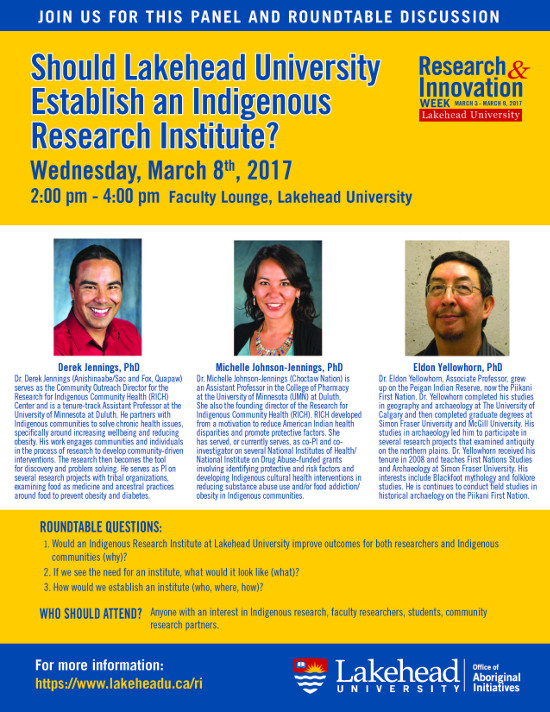Indigenous Research Institute is the focus of a discussion at Lakehead University
March 1, 2017 – Thunder Bay, ON
Lakehead University has a well-established relationship of research projects and partnerships with Aboriginal communities, so is the time ripe to set up a dedicated Indigenous Research Institute?
That is the focus of a discussion taking place March 8 during Research and Innovation Week.
For Dr. Peggy Smith, the answer is an unequivocal yes.
“We have numerous researchers at Lakehead who are working with Indigenous communities, so a research centre would be a place where people could share experiences and find people to work with. It would promote interdisciplinarity, getting researchers from different fields to work together to serve the needs of Indigenous communities,” says Smith, Interim Vice-Provost (Aboriginal Initiatives) at Lakehead.
Lakehead, situated in the heart of Indigenous territories, boasts almost one-in-five students of Aboriginal ancestry. Its Strategic Research Plan commits to research that is relevant to First Nation, Metis and Inuit peoples. To date, there are more than 30 such projects, focussing on community needs ranging from the arts to health, education, science, land management and culture.
“There’s a rich and long history at Lakehead of faculty members doing research with Indigenous communities,” Smith says, adding this work advances knowledge about Indigenous issues and helps improve conditions in these communities.
With such a track record, the next step would be an actual centre to serve the needs of faculty, students and the community at large.
“We’re still very much talking about the concept, how we would do it and what it would do,” Smith explains.
The roundtable discussion features speakers who have experience in cross-cultural learning and what is needed to set up an Indigenous-focused research institute.
They are:
- Dr. Eldon Yellowhorn of Simon Fraser University teaches First Nations studies and archaeology. He has participated in research projects on the northern plains, as well as Blackfoot mythology and folklore.
- Dr. Derek Jennings of the University of Minnesota-Duluth is community outreach director at the Research for Indigenous Community Health Center. He works with Indigenous communities on chronic health issues, such as obesity.
- Dr. Michelle Johnson-Jennings, also of the University of Minnesota-Duluth, is founding director of the Research for Indigenous Community Health Center. Her specialty is cultural health beliefs and behavioural interventions regarding addiction.
Johnson-Jennings believes a dedicated Indigenous research institute demonstrates academic commitment to Indigenous communities and recognizes and values Indigenous knowledge.
“Indigenous community voices that are often marginalized within non-native institutes can have a space to be heard and elevated within an Indigenous centre,” Johnson-Jennings says.
“In doing so, true partnership between academics and tribes can be formed, resources and support given for both academics and tribes to engage meaningfully, and a path forged for future work,” she says.
Such a facility, to be named the Gichi Kendaasiwin Centre (meaning “higher knowledge” in Ojibwe), will not only house Aboriginal programs and services, but will also engage Aboriginal learners in all disciplines and will be a gathering place for the exchange of ideas from the region, across Canada and around the world.
“We’re still very much in the conceptual stage,” Smith says. “This is a key discussion we’re having and it’ll take us a good way along” the path to realizing the goal of having an Indigenous Research Institute.
The roundtable discussion called Should Lakehead University Establish an Indigenous Research Institute? is set for Wednesday, March 8, from 2-4 p.m., at the Lakehead University Faculty Lounge (UC 1029G).
– 30 –
Media: For more information or to arrange interviews, please contact Brandon Walker, Media Relations Officer, at (807) 343-8177, or mediarelations@lakeheadu.ca.
Lakehead University has about 9,700 full-time equivalent students and 2,000 faculty and staff in 10 faculties at two campuses in Orillia and Thunder Bay, Ontario. Lakehead is a fully comprehensive university: home to Ontario’s newest Faculty of Law in 44 years, the Northern Ontario School of Medicine, and faculties of Engineering, Business Administration, Health & Behavioural Sciences, Social Sciences & Humanities, Science & Environmental Studies, Natural Resources Management, Education, and Graduate Studies. In 2016, for the second consecutive year, Re$earch Infosource ranked Lakehead first among Canada’s undergraduate universities. Visit www.lakeheadu.ca.


